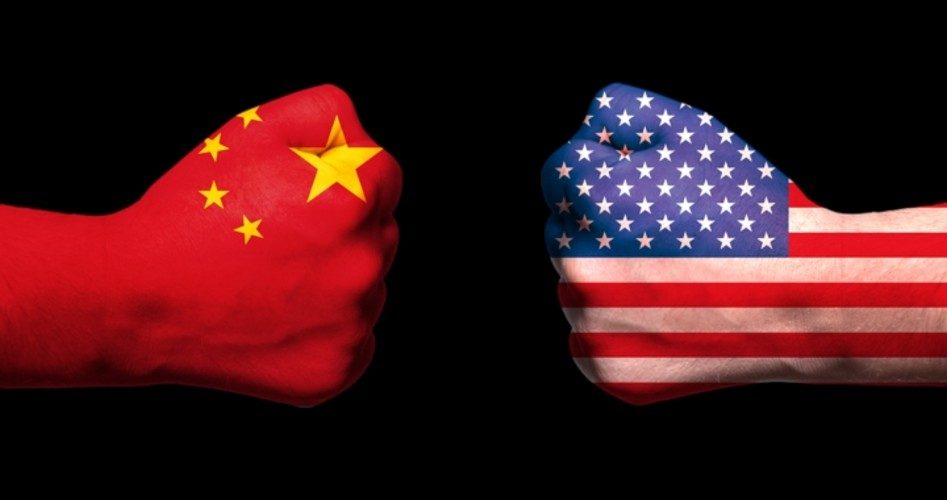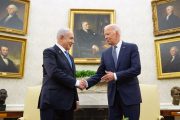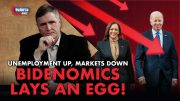
Previous Republican and Democrat administrations have ignored China’s cheating — and have, in fact rewarded the Communist regime’s criminal activities. But President Donald Trump has taken important initial steps in addressing Beijing’s economic and national security threats to America.
For decades, China has been building itself into an economic and military powerhouse. But that path to global superpower status would have been impossible for the communist regime without the massive assistance provided by Republicans and Democrats alike. These politicians and their globalist corporate supporters have been more than willing to overlook China’s totalitarian rule and horrid human rights record. Even worse, they also have been willing to ignore the enormous danger that Beijing’s extensive technology theft, trade cheating, extortion, cyber espionage, and other criminal practices pose to America’s economic survival and national security.
How serious is this danger? In a recent interview on PBS News Hour, White House trade advisor Peter Navarro said that if the United States allows China to cheat and steal American intellectual property, “we won’t have a future.
{modulepos inner_text_ad}
“The big picture here is that China has been stealing our intellectual property for years,” Dr. Navarro told PBS News Hour’s Judy Woodruff. “When an American company goes to China, they force that American company to surrender its technology to a Chinese competitor. That Chinese competitor winds up beating the American company, not just in the Chinese market, but around the world. And that’s an unsustainable situation that President Trump has decided to crack down on.”
“It’s not just that China cheats and steals our intellectual property,” says Navarro. “They’re also coming with large bags full of money to basically buy up the crown jewels of American technology. And the biggest picture here is China has this thing called China 2025. It’s a policy manifesto which says that they want to take over all of the emerging industries of the future, artificial intelligence, robotics, quantum computing, these things.”
The New American has been, for many years, sounding the warning on U.S.-China inbound and outbound investing, as well as the many “deals” with the Beijing dictatorship that have not only killed millions of American jobs, but also transferred crucially important technology, manufacturing processes, plants, and state-of-the-art R&D facilities to China. Yet China is a Stalinist one-party state that views America as its primary enemy. (See articles linked below at the bottom of this story.) A recent story here by Bob Adelmann provides sobering facts about China’s intellectual property theft, industry subsidies, military weaponry theft, cybertheft, and other attacks on the United States and the rest of the world.
After decades of pretend concern and rhetoric from the White House and Congress, it appears that President Trump is actually taking serious action. In his April 4 PBS interview, Dr. Navarro warned that “if we allow China doing this, particularly using unfair trade practices, we won’t have a future. And that’s what President Trump is very concerned about. So, when he ordered Ambassador Lighthizer to push forward these tariffs, we’re in a 60-day process to review them and get public comment, per a solid procedure.”
Politico’s Adam Behsudi reported on April 12 that Senator Chuck Grassley (R-Iowa) had recently returned from a trip to China convinced that the communist regime is willing to do anything to beat the United States economically. “I kind of came away with the opinion they’ll do anything legal or illegal, anything moral or immoral, anything ethical or unethical, to do whatever they want, to get ahead and stay ahead,” Sen. Grassley said at a Senate Finance trade subcommittee hearing. The Iowa Republican, who voted to let China into the World Trade Organization in 2001, said “it hasn’t turned out the way that I anticipated,” because of China’s trade violations. He said that he “kind of feel like I should be sorry for my vote” to support China’s WTO membership. Grassley, said Politico, “also fumed about China’s continued insistence that it be treated as a developing country under WTO rules since that allows more lenient treatment.” That doesn’t pass “the common-sense test,” Grassley said, since China is now the world’s second-largest economy.
How Does China Cheat Us? Let Us Count the Ways
“Based on China’s conduct in the aluminum industry, foreign capital markets, and what I’ve come to understand from many years of living and doing business there, I have no doubt China is breaking the rules across numerous industries,” writes Carson Block, Chief Investment Officer of Muddy Waters Capital LLC, in a March 13, 2018 article for Forbes entitled “Yes, China Does Cheat In Trade — The Rest Of The World Needs To Wake Up.” “The entire multilateral trading system — not just the U.S. — is the victim of China’s cheating,” Mr. Block charges. “Government ownership of China’s banking system, and the enormity of its state-owned enterprise sector, give China the tools to illegally subsidize industries in ways that are hard to detect. To be clear, China’s activities are not the same as a country exploiting the economic principles of comparative advantage. China has also allowed the engineers of literally hundreds of stock frauds to get away scot-free with tens of billions of dollars fraudulently taken from western investors. It is disheartening that only the U.S. thus far seems fed up with China’s cheating.”
Block cites the aluminum industry as a clear example of China’s cheating. “We have observed the cheating first hand through research my firm and I have previously conducted on the sector. Research we conducted in 2015, under the name Dupré Analytics, showed that state-owned banks in China made billions of dollars in loans to shell companies to purchase aluminum from China-based aluminum giant, China Zhongwang. It is highly unlikely that these loans, which were made to entities that were not even remotely creditworthy, occurred without approval from the highest levels of the Chinese government. Late last year, the U.S. Department of Justice filed a complaint against a California company called Perfectus Aluminum, alleging that Perfectus was an affiliate of Zhongwang and leveling a different accusation — that Perfectus had evaded $1.5 billion in U.S. import duties.”
Then, last year, Block reports, a different Chinese alumnimum giant, China Hongqiao Group, was also alleged to be cheating. “Hongqiao, which is listed on the Hong Kong stock exchange, claims to be the world’s largest aluminum producer,” says Block. “Research firm Emerson Analytics released a report alleging Hongqiao was vastly overstating its profits and committing widespread fraud. One of the points Emerson Analytics raised was the company’s reported expenses on electricity, which they claimed were too low to be true. Hongqiao’s major outside electricity supplier is owned by a local government.”
In response to the Emerson report, the Hongqiao stock was temporarily halted. Despite the controversy, says Block, Hongqiao received fresh financing from China’s state-owned CITIC bank. “The stock subsequently resumed trading, and within a week was trading about 80% above its last close prior to the halt. Because it’s hard to believe that the report, halt, and auditor actions made the case that Hongqiao is more valuable, I believe the price spike was caused by manipulation. If I’m correct, this manipulation was effectively a subsidy in real-time. As a corollary, in true communist memory hole fashion, Hongqiao sued Emerson in Hong Kong, and received an injunction that has made it significantly harder to find the report online.”
“Another industry in which I have first-hand knowledge of China’s cheating is the capital markets,” writes Block. “The upcoming documentary The China Hustle chronicles the wave of reverse merger frauds from the last decade in which literally hundreds of fraudulent companies from China listed in the U.S., collectively raising tens of billions of dollars from investors. The funds were sent to China, separated forever from those wronged by the fraud. Virtually nobody from China has been imprisoned for these crimes, highlighting the discrepancy between China and the West when it comes to upholding the rule of law.”
“More to the point,” says Block, “I also believe that China has a concerted strategy to degrade the economies of, and transfer wealth from western countries. My view seems to be supported by the recent statements of FBI Director Christopher Wray who warned that China is a ‘whole of society threat.’”
“The Trump administration fortunately seems to understand the dangers to a greater extent than its predecessors did,” Block states. “Unfortunately, our major trading partners do not seem to be aware of the enormity and dangers of the problem.”
Although President Trump has been taking a severe, non-stop verbal thrashing from much of the pro-China lobby in Big Business, Big Banking, and Big Media circles for his tariff announcements, he has been winning some surprising converts. Economist-columnist-commentator Stephen Moore wrote recently, in his Townhall column, that “Trump makes a strong case that many of our trading partners — most notably, China — are violating trade-agreement rules left and right and stealing American patents and intellectual property. And they have been doing so for years and years with impunity.”
“China is estimated to be pirating more than a half trillion dollars’ worth of American technology, inventions, drugs, vaccines and computer software each year,” says Moore. “That is theft, and it cannot stand. Trump is right that we’ve tolerated these abuses under a belief that to challenge them would violate principles of free trade. There has also been a sense of resignation in Washington over this issue — a feeling that there isn’t much America can do about it. Nonsense. We are being played as suckers.”
Moore, a neoconservative anti-tariff/free trade advocate, is a regular writer at neocon platforms such as the Wall Street Journal, National Review, and The Weekly Standard. Before moving over to CNN in 2017, he was a regular economic commentator on Fox News. “Trump has introduced a new strategic doctrine on trade, and though I have some reservations (I opposed the steel tariffs), it’s important that we understand it and realistically assess its merits,” says Moore. “Trump’s election proves that a sizable number of voters in both parties aren’t buying into the unfettered unilateral free trade posture that the U.S. government has held for the last several decades,” Moore notes. “Trump may be on to something here, and I don’t know if I’d endorse his trade doctrine, but it’s worth considering and not dismissing out of hand.”
Photo: Eblis/iStock/Getty Images Plus
Related articles:
China’s Trump Card: $1.1 Trillion in U.S. Treasuries
China’s Propagandists in U.S. Media Exposed by a Reporter’s Eye-Roll That Went Viral
China Buys U.S. Firms at Record Rate
Is the U.S. Being Colonized By Communist China?
China: Staking Claim in the New World Order
China’s Communist Billionaires: Darlings of Harvard, Wall Street, CFR
Stop China Buyout of Chicago Stock Exchange: Congressmen to Obama
China Cash and Movie Moguls — The Disturbing New Hollywood-Beijing Axis
China Bids for Sheraton/Westin Hotels; TPP Will Help Beijing Buyouts
China Bans Bible Sales at Online Bookstores and Tightens Control Over Religion




